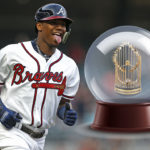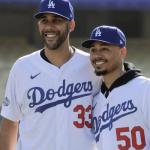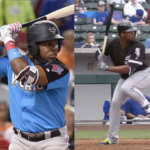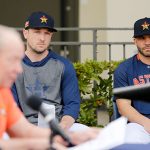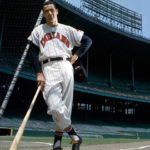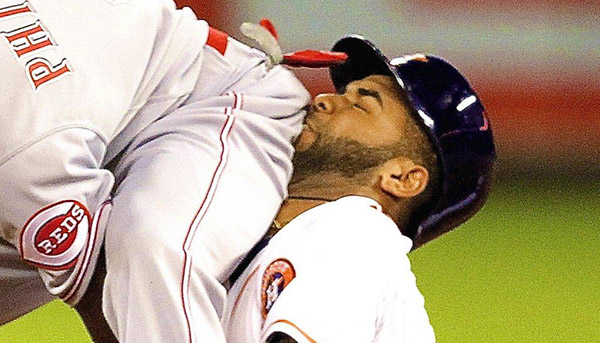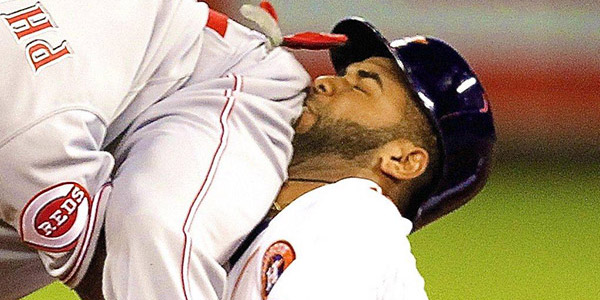A Look Back at a Friday Night Baseball, 1961
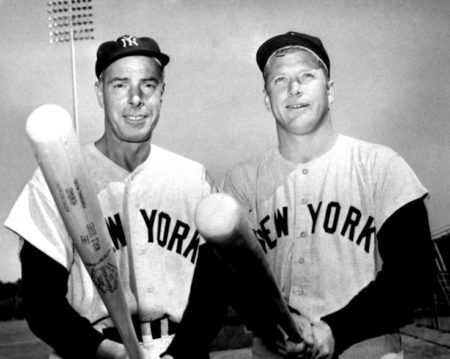 It’s true, when I switch on a baseball game, I’m not only stepping outside the rhythms of everyday life, but there’s a feeling of safety and comfort, and I can almost feel my grandfather’s arm around my back as we watched Friday night baseball games together more than half a century ago. The days when Mickey Mantle and Al Kaline, and Willie Mays and Hank Aaron were household names.
It’s true, when I switch on a baseball game, I’m not only stepping outside the rhythms of everyday life, but there’s a feeling of safety and comfort, and I can almost feel my grandfather’s arm around my back as we watched Friday night baseball games together more than half a century ago. The days when Mickey Mantle and Al Kaline, and Willie Mays and Hank Aaron were household names.
In those days, I was eight years old. And when my parents dropped me off at my grandparent’s house, I knew I’d be watching baseball that night on the 19-inch grainy black-and-white television set in the bedroom, as long as a game was on.
Before the game, I would sit in the kitchen munching on a grilled cheese sandwich. I hadn’t yet developed the stomach for the chicken bones that my grandfather liked to dip in mustard before biting down and cracking the bones open, so he could suck out the marrow inside. Despite all the Ballantine Beer ads on Yankees games, he never reached for a Ballantine blast, as Mel Allen frequently referred to Yankees home runs.
“There’s a long drive, it’s going, going, gone. Friends, that’s a Ballantine blast,” spoken as only Mel Allen could, fluently with great guttural contrast in a Southern twang he had honed in Alabama.
Before the game started, we went into the bedroom, fluffed up some pillows, and leaned back to watch.
The game began. Leadoff hitter and second baseman Jake Wood walked, trotted to first, and scored almost immediately on centerfielder Billy Bruton’s little pop fly that arched harmlessly into the right field stands, and just like that, Detroit was ahead 2-0.
As Billy Stafford struggled through the first, grandfather sucked on a filter-less Chesterfield cigarette, the brand he’d been smoking since he was my age. In between puffs, he swung his arms around as though he was about to do some clutch hitting himself and spoke about his favorite Yankees. Joe DiMaggio, Lou Gehrig and Babe Ruth, all of whom he had seen play as a youngster.
Just for a moment, he lost himself in Joe DiMaggio’s 56-game hitting streak. As the War was becoming worse, DiMaggio’s streak, which ran from May through the middle of July 1941, softened the impact that had begun to rage across the Atlantic. And after the one game DiMaggio did not record a hit, he went 16 more games with at least one hit into early August, before the streak was finally over. Almost as much of an amazing accomplishment as DiMaggio skating across the outfield and seamlessly slowing to a balletic pause as a ball floated into his glove. No WAR statistic could explain his artistry.
I didn’t understand about war yet. At eight years old, war was a foreign concept. In five or six years, I would understand what war meant when the Vietnam War dominated headlines and news broadcasts. Grandfather paused, looked at me and half-smiled, then said, after that 1941 season ended, nothing could change the bitterness of December 7, 1941, when the Japanese attacked Pearl Harbor. He said many people feared there might not be a 1942 season if things got worse. But baseball persevered, and there was a 1942 season.
Mickey Mantle strode to home plate to start the bottom of the inning. But grandfather was right, baseball was too important to cancel. And after Mantle struck out, Johnny Blanchard, the Yankees catcher, slammed a line drive into the right field stands, making the score 2-1. That’s when grandfather said he had sat in the right field stands at the Stadium in the late ’20s, but never caught one of Babe Ruth’s blasts, though he wanted one very much. Any one of Babe Ruth’s 60 home runs in 1927 would’ve sufficed. But that’s baseball, he said. You don’t always win. Sometimes you have to accept the good with the bad.
Once more, he gushed over Ruth’s home run partner, Lou Gehrig, whose wonderful, powerful career culminated in a consecutive game streak of 2,130 games that came to an end on a fateful day in May 1939 when Ellsworth ‘Babe’ Dahlgren grabbed a first baseman’s glove and took the field in what would have been Gehrig’s 2131st consecutive game, had he played. But he didn’t.
Another one-two-three inning. Al Kaline, Rocky Colavito and Norm Cash struck out. Cheers fanned through the tinny speaker of the television. No remote control, so I went over and lowered the volume as grandfather said that the city drowned in Gehrig’s sadness. He was such a great player, and then his body was silenced. His powerful bat was silenced. No recourse. Just regrets. Regrets that smelled like the rancid aroma of those bitter Chesterfield’s he kept smoking.
From what I could tell, the powerful Yankees attack and the Chesterfields seemed to calm him after a long week, or that’s what he said as he closed his eyes when the game was assuredly in the win column for the Yankees, ahead 10-2.
Luis Arroyo, the diminutive lefty reliever on the ’61 Yankees, hopped over the three-foot bullpen gate and loped into the game to secure the last few outs. He had a compact fireplug body. Into his delivery he contorted like a rope coiled tightly around a post before he whipped his arm around and slung a nasty curveball at the helpless hitter. Several of those despicable curves and Arroyo closed the game for the Yankees.
Grandfather was already asleep. Snoring. Did not hear the last Ballantine beer commercial. I left him in the bedroom and saw grandmother on the telephone in the foyer. She was not a baseball fan.
But for grandfather and me, baseball was a way to make a strong connection between fact and fiction. His arm on my shoulder. That’s why baseball could explain so much. As when Sandy Koufax broke off one of his unhittable curveballs that swept across the plate like an epic saga, it took that long to break the plane. That curveball could explain other unfathomable events. Fables about morality. About failure. About what could be, or could never be. Just a belief that hidden in the scorecard were the secrets of the world waiting to be deciphered. Why one-for-three was not all that bad.
